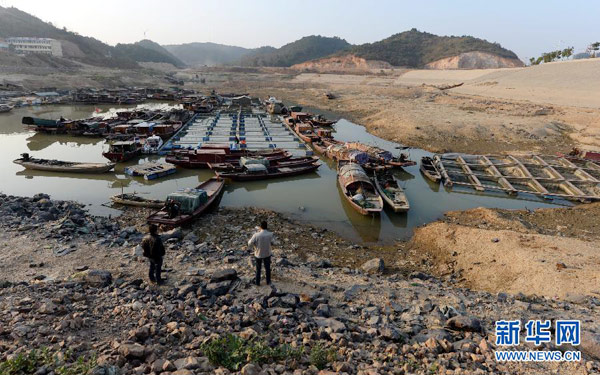 |
| China's largest freshwater lake, Poyang Lake, has seen decreasing water level in recent days. (Photo/Xinhuanet) |
NANCHANG, Nov. 13 -- China's largest freshwater lake, Poyang, is surrounded by purplish-red flowers, with grazing sheep and picnickers enjoying lunch on its dry lake bed.
"I started herding my sheep to the lake in late September, a month earlier than I did several years ago," said Cheng Wenwei, a veteran shepherd living near Poyang in northern Jiangxi Province.
"That's because the lake water has started to ebb earlier," Cheng explained, while tending his 200-head flock.
In early November, Poyang was reduced to streams, with some parts of its vast lake bed becoming pasture or sand after the lake's annual dry season arrived on Oct. 19.
Data from the Jiangxi Provincial Hydrographic Bureau show that, between 2003 and 2013, the average date when the lake entered its dry season was Oct. 27, 52 days earlier than the average recorded between 1952 and 2002.
The lake's dry season is signaled when a benchmark hydrological spot, Xingzi Station, records water levels below 10 meters. The dry season normally ends in late March.
Due to the lake's prolonged dry seasons over the last decade, an escalating water shortage has caused drinking water scarcity, crippled the local fishing industry, and threatened the lake's ecology.
Fed by five major rivers in Jiangxi, Poyang is located in the middle and lower reaches of the Yangtze River, with the lake's discharges accounting for about 15 percent of the Yangtze's annual runoff.
DROUGHT AND DAMS
Experts and local officials believe persistent drought and a cluster of hydropower dams on the Yangtze are two primary contributors to the lake's water crisis, in addition to increasing water use and damages to the lake bed.
In recent years, the lake has seen dwindling precipitation during its dry season, caused by increasingly uneven distribution of rain, which has made dry days even drier, said Tan Guoliang, director of the hydrographic bureau.
Meteorological data showed the province has received 60 percent less precipitation since September than the average over the same period since records began in 1952.
A lack of rainfall this year has taken a heavier toll on the lake, as earlier this month some of its monitoring stations recorded water levels very close to their historic lows, according to Tan.
In addition, 29 dams built on the upper reaches of the Yangtze, with a total storage capacity of 53 billion cubic meters, also contributed to the early arrival of Poyang's dry season, said Wang Hao, an expert with the China Institute of Water Resources and Hydropower Research.

 Luxury-cars parade held in Dubai
Luxury-cars parade held in Dubai Special forces take tough training sessions
Special forces take tough training sessions Fire guts 22-storey Nigeria commercial building in Lagos
Fire guts 22-storey Nigeria commercial building in Lagos A girl takes care of paralyzed father for 10 years
A girl takes care of paralyzed father for 10 years A record of Beijing air quality change
A record of Beijing air quality change In pictures: explosions occur in Taiyuan
In pictures: explosions occur in Taiyuan Live a harmonious life in Pu'er, SW China
Live a harmonious life in Pu'er, SW China Weekly Sports Photos
Weekly Sports Photos Gingko leaves turn brilliant golden yellow in Beijing
Gingko leaves turn brilliant golden yellow in Beijing Maritime counter-terrorism drill
Maritime counter-terrorism drill Loyal dog waits for master for six months
Loyal dog waits for master for six months The catwalk to the world of fashion
The catwalk to the world of fashion  China in autumn: Kingdom of red and golden
China in autumn: Kingdom of red and golden National Geographic Traveler Photo Contest
National Geographic Traveler Photo Contest Living in an urban village: 'Iron-digger' Xiong Sansan
Living in an urban village: 'Iron-digger' Xiong SansanDay|Week|Month